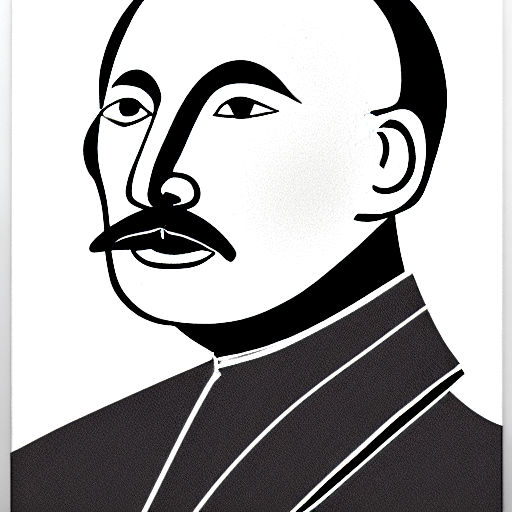Chiang Kai-shek (31 October 1887 – 5 April 1975), also known as Chiang Chung-cheng, Chiang Chieh-shih, Cheung Kai-shek and Jiang Jieshi, was a Chinese Nationalist politician, revolutionary, and military leader, who served as the leader of the Republic of China from 1928, until 1949 in mainland China, and then in Taiwan until his death in 1975.
Born in Chekiang (Zhejiang) Province, Chiang was a member of the Kuomintang (KMT), and a lieutenant of Sun Yat-sen in the revolution to overthrow the Beiyang government and reunify China. With help from the Soviets and the Chinese Communist Party (CCP), Chiang organized the military for Sun's Canton Nationalist Government and headed the Whampoa Military Academy. Commander-in-chief of the National Revolutionary Army (from which he came to be known as a Generalissimo), he led the Northern Expedition from 1926 to 1928, before defeating a coalition of warlords and nominally reunifying China under a new Nationalist government. Midway through the Northern Expedition, the KMT–CCP alliance broke down and Chiang massacred communists inside the party, triggering a civil war with the CCP, which he eventually lost in 1949.
As the leader of the Republic of China in the Nanjing decade, Chiang sought to strike a difficult balance between modernizing China, while also devoting resources to defending the nation against the CCP, warlords, and the impending Japanese threat. Trying to avoid a war with Japan while hostilities with the CCP continued, he was kidnapped in the Xi'an Incident, and obliged to form an Anti-Japanese United Front with the CCP. Following the Marco Polo Bridge Incident in 1937, he mobilized China for the Second Sino-Japanese War. For eight years, he led the war of resistance against a vastly superior enemy, mostly from the wartime capital Chongqing. As the leader of a major Allied power, Chiang met with British Prime Minister Winston Churchill and U.S. President Franklin D. Roosevelt in the Cairo Conference to discuss terms for the Japanese surrender. When the Second World War ended, the Civil War with the communists (by then led by Mao Zedong) resumed. Chiang's nationalists were mostly defeated in a few decisive battles in 1948.
In 1949, Chiang's government and army retreated to Taiwan, where Chiang imposed martial law and persecuted critics during the White Terror. Presiding over a period of social reforms and economic prosperity, Chiang won five elections to six-year terms as President of the Republic of China, and was Director-General of the Kuomintang until his death in 1975, three years into his fifth term as president, and one year before Mao's death.
One of the longest-serving non-royal heads of state in the 20th century, Chiang was the longest-serving non-royal ruler of China, having held the post for 46 years. Like Mao, he is regarded as a controversial figure. Supporters credit him with playing a major part in unifying the nation and leading the Chinese resistance against Japan, as well as with countering Communist influence. Detractors and critics denounce him as a fascist dictator at the front of a corrupt authoritarian regime that suppressed opponents. Chiang was credited with stabilizing the Taiwan currency with the gold bullion he brought to Taiwan from mainland China as well as the national treasures of China during the 1949 retreat.
Sol turns thousands of years of human wisdom from the world’s spiritual traditions into a totally unique personality profile. To get your own profile, check compatibility with friends and much more, download the Sol App today.
Some of their strengths
Chiang Kai-Shek has many admirable traits.
Based on spiritual traditions from around the world, they are someone who can be described as Intense, Adventurous, Passionate, Intuitive, Brave, Honest, and Generous.
Intense and Passionate
According to Mysticism’s Astrology tradition, Chiang Kai-Shek is someone who is an intense, passionate, and intuitive person who is fiercely independent, authentic and direct when engaging with others. A person who defines themself by their friends and what groups they belong to.
Helpful and Supportive
Based on Daoism’s Ba-Zi or ‘Chinese Zodiac’ tradition, people who know Chiang Kai-Shek well know them as someone who can be accepting, supportive, and productive, like a garden.
Organized and Achievement-oriented
According to Hinduism’s Jyotisha or ‘Vedic Astrology’ tradition, many would also describe Chiang Kai-Shek as someone who is organized, goal-oriented, practical, and persevering.
Who is hardworking, intellectual, and easygoing, who loves higher education and learning and sharing ideas with others, and who loves healthy competition.
Courageous and Strong
Based on the Mayan Tzolk’in or ‘Mayan Astrology’ tradition, Chiang Kai-Shek is someone who is a risk-taker and a pioneer who only gets stronger through the hardships that are encountered in life.
They are also someone who is curious, dynamic, and positive, and who enjoys inspiring and communicating with other people.
Mysterious and Methodical
According to Judaism’s Kabbalah tradition, Chiang Kai-Shek tends to be someone who can come across as mysterious and intense, who can be a complex thinker who is methodical and intuitive, and who can overcome challenges that most others would not be able to.
Some of Chiang Kai-Shek's challenges
While Chiang Kai-Shek has many strengths, nobody is perfect. They also have some challenging traits they need to manage.
For example, Chiang Kai-Shek can be Stubborn, Callous, Complicated, Brusque, Short-tempered, Impulsive, and Suspicious.
Complicated and Brusque
One of Chiang Kai-Shek's key challenges is that they are someone who can be complicated and gruff with others.
Chiang Kai-Shek must also exercise caution as they can have a hard time reconciling wants and needs, and can have difficulty dealing with responsibility, authority, or criticism.
Callous and Selfish
Chiang Kai-Shek is someone who can be standoffish, pessimistic, and ruthless, who can have difficulty concentrating and be impatient, can have difficulty discovering the keys to personal contentment, and who can have a tendency to overwork and hoard wealth and possessions.
Sensitive and Aggressive
Finally, Chiang Kai-Shek also can be too "touchy-feely", have a hard time expressing feelings, be too aggressive and headstrong, and be too unforgiving of others' mistakes.

